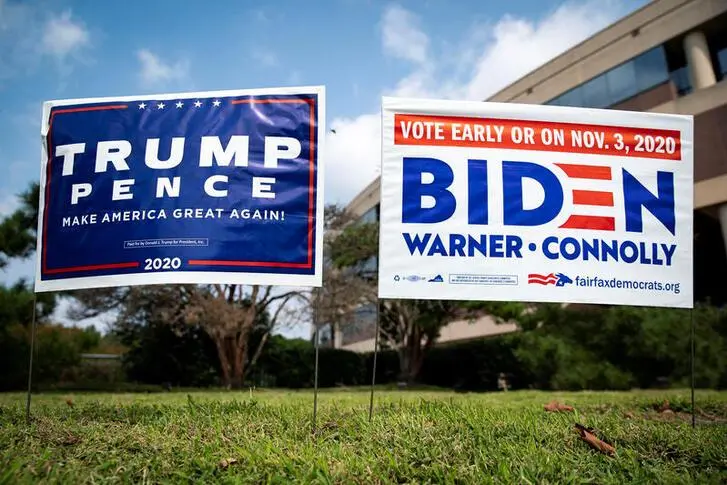PHOTO
Donald Trump and Joe Biden meet for the first presidential debate on Tuesday with not just themselves but “Brand America” itself on the ballot.
With Trump narrowing Biden’s advantage in some national polls in what could yet be a cliffhanger in November, his against-the-odds re-election would send shockwaves around the world; while Trump is popular in a small number of countries, including Israel and the Gulf states, the overwhelming majority outside America favor Biden, as they didHillary Clinton four years ago.
To be fair to the president, he has scored foreign policy successes, including the recent US-brokered accords between the UAE and Bahrain and Israel. However, his overall international record is underwhelming, with key initiatives such as his peace gambit with North Korea flatlining.
But it is not even Trump’s record of foreign policy failure that has hit Brand America (the reputation of the US) hardest,but his leadership style and maverick instincts. Shashi Tharoor, former UN under-secretary general and currently an Indian MP, has asserted that the president’s election could mean “the end of US soft power” by entrenching “tendencies the world never used to associate the US with xenophobia, misogyny, pessimism and selfishness.”
Policies that have caused diplomatic angst include his construction of a border wall with Mexico, which he claims the Mexican government will ultimately pay for, and his proposed ban on all Muslims entering the US, a commitment on which he later rowed back.
Attitudes toward Trump have consistently been much more negative than those toward his predecessor, Barack Obama, in the overwhelming majority of countries. In many states, ratings for Trump are similar to or worse than those for George W. Bush near the end of his presidency. In a Pew Global poll this month of perceptions of Trump in 13 Western countries, his most negative assessment was in Belgium, where only 9 percent had confidence in the US president to “do the right thing in world affairs,” and his highest rating was in Japan, where on 25 percent expressed confidence in him.
If Trump does win again, there could be a further spike in anti-US sentiment and the overall impact could be significantly more marked than during Bush’s presidency, when anti-Americanism last reached a nadir. When Bush left office in early 2009, anti-US sentiment was at its highest levels since the Vietnam War. The key factor was the international unpopularity of the Bush administration’s foreign, security and military policies in the so-called “war on terror.”
In the decade since then, the Obama administration was able to partially reverse those public opinion patterns. There was a substantial increase in foreigners regarding the US as the most admired country in the world. This turnaround in fortunes was not only welcomed in Washington but also in corporate America following concerns during the Bush years that US-headquartered multinationals were suffering commercial backlash from anti-Americanism.
Despite these successes, Obama’s progress was uneven and he failed to fully capitalize upon what former French President Nicolas Sarkozy called the country’s “return to the hearts of the people of the world.” Many were disappointed by Obama’s failure to close Guantanamo Bay, and there was significant foreign unease about increased US use of drone strikes during his presidency.
Perhaps the biggest failure of Obama’s global public diplomacy was in what he called the Islamic world. Despite the early promise of his Cairo speech in his first term in which he sought to reset US relations with Muslim-majority countries, there remained pockets of anti-Americanism in several key states, including Pakistan and Egypt, at the end of his presidency. And since early 2017 Trump has only intensified this sentiment. While he has been criticized during his presidency by audiences across much of the globe, it is in the so-called Islamic world that the risks are highest.
Thus, if Trump were re-elected, global opinion could be significantly more hostile than even toward Bush in his own second term, highlighting the downside risks for Brand America, and the potential upside opportunity for America’s reputation if Biden ultimately pulls through and wins in November.
- Andrew Hammond is an Associate at LSE IDEAS at the London School of Economics
Copyright: Arab News © 2020 All rights reserved. Provided by SyndiGate Media Inc. (Syndigate.info).





















